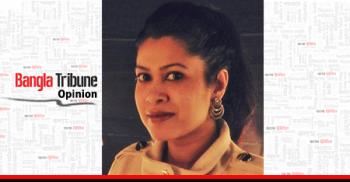 When we talk about social media in Bangladesh’s context, Facebook has figuratively become the face of our lives. We share our thoughts, success stories, and memorable moments through pictures as well as being in touch with one another from different parts of the world. It has also become an essential tool for us to get informed about stories and news from everywhere. The platform gives a shy person a voice with a few clicks; loners to have virtual friends, opinion from introverts who wouldn’t normally talk in real life. Having said so, it also has bullies, predators, and abusers. As much as social media platforms have given us a wider a horizon to connect to the rest of the world, it has also in many contexts, taken away our privacy and is responsible for some confusion.
When we talk about social media in Bangladesh’s context, Facebook has figuratively become the face of our lives. We share our thoughts, success stories, and memorable moments through pictures as well as being in touch with one another from different parts of the world. It has also become an essential tool for us to get informed about stories and news from everywhere. The platform gives a shy person a voice with a few clicks; loners to have virtual friends, opinion from introverts who wouldn’t normally talk in real life. Having said so, it also has bullies, predators, and abusers. As much as social media platforms have given us a wider a horizon to connect to the rest of the world, it has also in many contexts, taken away our privacy and is responsible for some confusion.
Should we really take a step back, take a deep breath and understand about our responsibilities while using social media? Do we really understand the consequences of our reactions and opinions?
Trolling and shaming
Where is the fine line between a sarcastic, funny meme that’s entertaining and making fun of individuals, shaming them and laughing at them? Yes, we should criticize, have opinions and have dialogues to make valid points. Raising awareness about a good cause is also acceptable. But at the age of self-awareness, perspectives need to be defined and understood. For the last two years, the ‘Miss World Bangladesh’ competition grabbed the attention of the populace for all the wrong reasons. Participants or winners previously being married, lack of general knowledge during Q&A session, etc. have been keenly debated on social media. There were memes, posts and even media reports on their backgrounds; some going as far as talking to contestant’s ex-husband. It is, to a high extent, the organizers’ responsibility to check the participants’ background before selection. They are also supposed to be grooming them, training them with basic etiquette and knowledge given that the participants come from different walks of lives from all over the country. While we were busy trolling and shaming the participant, we have completely missed the people who should be held accountable not only for the process they adopted but also for selecting an unprepared contestant as the winner to represent our country. But that wouldn’t have been funny or entertaining, so we went for the easiest route of shaming the participants of the show.
On a different perspective, when we are trolling and shaming people who have neither been under the spotlight ever nor trained to handle all the criticism, are we not putting them in a dark hole of self-doubts, de-motivation and depression? There have been instances of young people taking their own lives due to bullying and depression. Last year in July, Risila Binte Wazer, a Bangladeshi fashion model, shockingly took her own life while appearing live on social media. That incident, along with a few others, shocked Bangladeshi social media, where more and more people were talking about depression. Several people came forward to help them; to understand the burden and if possible to relieve them. Sadly, we are the very same people still trolling and shaming the young people for their behaviour and actions. If we are to create awareness on mental abuse that leads to the sort of depression which at times leads to suicide, shouldn’t we be more sensitive about what and who we are making fun of or laughing at?
Competing in comparison
Social media enables us with the opportunity to share our thoughts, celebrations, travelogues, etc. with our friends as and when they occur. However, it seems that the privilege has turned into an obsession. It has somehow become so essential that we must create these moments just so that we can post and get some attention. This craving for attention at times creates disputes, jealousy and even fall-outs between friends and family members. Our friendships are being judged by the number of likes. Lunch or dinner hangouts, where people should be conversing with each while enjoying a nice meal, have turned in to a photo opportunity for social media. Taking photos for memory has taken a back seat to lifestyle supremacy.
Aren’t we supposed to live these moments of celebration of our daily lives and share them with our friends? Or have they become mere vehicles of content creation?
Cyberbullying
Bullies these days are faceless. They are now preying on their victims through social media. Their targets vary from innocent school children to confused youths to insecure adults. Facebook is a platform to connect and sometimes reconnect with friends and family. Many make friends to create a network while making new friends. While it is a great way for networking, it also makes users vulnerable as we really don’t know the person or their intention behind the screen, which has caused many incidents of cyberbullying in not only Bangladesh but also throughout the world. Not only girls but boys are also facing cyberbullying, like threats over the phone and social media. According to a Telenor survey, 49% of school students from Bangladesh have been victims of cyberbullying.
According to UNICEF Bangladesh, in 2016, “Incidents of the cyber offence have increased in Bangladesh in recent times.” An example was when a girl recently was urged to have an illicit affair with a man through social media. After she rejected him, he started to blackmail her on social media several times which psychologically traumatized the girl and made her feel humiliated. Several cases like these have been taking place around the country and in some case, the victim commits suicide.”
If we are cautious about making friends with strangers in real life, why is it the opposite on social media?
Social media platforms, however, have created a lot of opportunities for many; reaching out for help, getting recommendations, easy marketing access, etc. But it has also cocooned us in a virtual world where we are all addicted to high level of anxiety. We are supposed to face our problems in life head-on. But it seems that our Facebook problems are now more real than reality. Bit by bit we are moving away from the realities of life. We don’t talk and solve problems face to face anymore; we unfriend or block people! Some of these issues have led to many people temporarily deactivating their social media account to take a moment to get back to reality, look at the real world and talk to real people. It is important to relate to the world, but it is also important to have a balance between real and virtual life.
Tanziral Dilshad Ditan is associate executive director at Forethought PR


